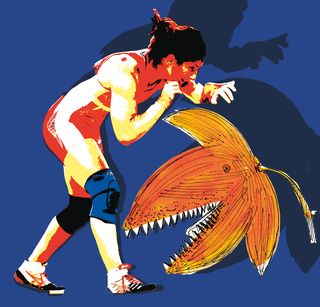I think Indians, irrespective of political leanings, were dismayed to see the country’s top wrestlers break down in tears, as they sat in a huddle by the riverbank, all set to immerse their medals in the Ganga river.
Farmer leader Naresh Tikait has been able to convince Vinesh Phogat and Sakshi Malik to refrain from doing so for another five days. The wrestlers have been on the streets for over a month demanding the arrest of the till recently Wrestling Federation of India chief and BJP MP from Uttar Pradesh Brijbhushan Sharan Singh, a strongman with an empire of private colleges and four pending criminal cases against him. In the past, Singh has been linked with underworld gangster Dawood Ibrahim, before being acquitted because of lack of evidence. In other words, he has always been a terrifying figure to take on.
This is important to understand why it would have taken so long for women in the wrestling community to break the silence around what they allege is entrenched sexual abuse and harassment. Seven women filed a complaint, among them reportedly a minor. Though there is now a dispute over the age of the minor girl, with an uncle claiming that she is at present 20 years old; the wrestlers say she was younger than 18 when the abuse took place, and hence the Protection of Children from Sexual Offences (POCSO) Act should apply. The law mandates an arrest before bail is granted. In this case, POCSO or not, Singh has not even been called for interrogation.
Singh is not a favourite with the BJP establishment. But he is a sort of autonomous island in the tightly controlled regime of Yogi Adityanath. He has openly criticised Adityanath’s government in the past. The BJP’s inaction against him is inexplicable, especially given the message it sends out to women and young girls everywhere.
Supporters of the government say the wrestlers have diminished the moral force of their movement by allowing opposition politicians to hijack it. Personally, I am not a fan of politician-led people’s movements. But let us remember that the politics was there from the start; otherwise why would a parliamentarian be heading a wrestling federation? Of course, this politicisation of sporting bodies did not start with the BJP; it was always there, right through Congress-run governments.
The worry now is that the shrill collision between the opposition and the BJP has made this yet another political headline, shifting the focus from this being about women in sport alleging institutional harassment and violations.
The United World Wrestling has made its displeasure clear, threatening to throw India out if elections are not held soon to choose a new management. But, as Phogat and Malik explain, Singh is de facto the man in control, even after the government said he had been asked to step aside as the head of the federation.
Singh’s guilt and innocence will be decided in court. But the fact that he has slandered the women who have spoken out against him—taunting with references to Manthara from the Ramayan, quipping that their medals are worth no more than Rs15—says a lot about the brazen impunity he still displays.
The government must begin a dialogue with the wrestlers and the police must act by the book, as it would have if the man in question was not a powerful politician.
And the wrestlers must not immerse their medals in the water. A day’s news cycle is not worth a lifetime of hard-won recognition.
editor@theweek.in


